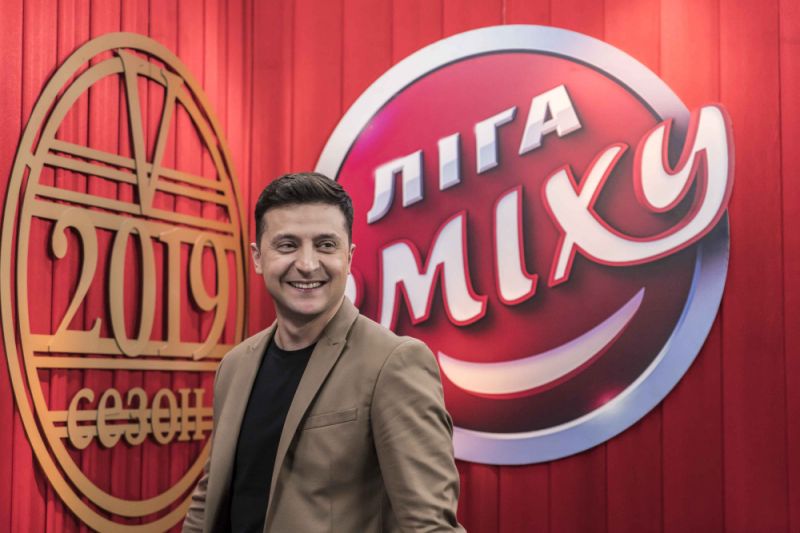

(Bloomberg Opinion) — Ukraine’s constitutional court has ruled that President Volodymyr Zelenskiy’s decision to disband the parliament and call an early election for July was legal. As a result, Zelensky appears about to win de facto control of the parliament, the way another political novice, French President Emmanuel Macron, did in 2017.
That’s likely to mean a revolution in Ukrainian politics not seen since the country gained independence in 1991 — for the political class, bigger even than the upheavals of 2004 and 2014. Most of the people likely to comprise the ruling political group or coalition in parliament have little or no political experience, though some of them are bright and highly motivated. With them, Zelenskiy gets a rare opportunity to drain Kiev’s post-Soviet swamp – but he’s given little indication so far of what he’s actually going to do with all that power.
It was clear from the start Zelenskiy, a former comedian and TV producer, would get nowhere with the existing parliament, filled with unelectable allies of former President Petro Poroshenko and ex-Prime Minister Arseniy Yatsenyuk. They conspired to prevent the new leader from disbanding the legislature by feigning coalition talks, refused to change the election system from a combination of first-past-the-post and proportional to a purely proportional one, wouldn’t allow Poroshenko’s old cabinet to resign and torpedoed an anti-corruption bill sponsored by Zelenskiy.
Had the court struck down Zelenskiy’s attempt to call an early election, he’d have been tied down by the hostile legislature, and the months of forced inaction would have hurt his chances in the regular election in the fall. But now the vote will take place on July 21, and that doesn’t leave enough time for any major changes in voter preferences.
According to polls, Zelenskiy’s start-up party, Servant of the People (named after the TV series in which he played a novice president), is about to win between 40% and 50% of the party list vote, which fills half of the legislature’s 450 seats. The other half consists of winners in individual constituencies, and a lot depends on Servant of the People’s ability to win these races, in which established party machines traditionally do well. There’s pretty much no doubt, however, that ZelenskIy’s party will be the biggest.
If it doesn’t win an outright majority, which is Zelenskiy’s declared goal, it’s only likely to need one junior partner, and that could well be another political start-up, Voice, led by rock star Svyatoslav Vakarchuk. Some influential Ukrainians counted on Vakarchuk to run in the presidential election, and it was in part his refusal that gave Zelenskiy a relatively easy victory. Now, Voice is polling between 6% and 10%. Neither party has ruled out cooperation, and there are indications that coalition discussions are already going on.
The two parties would be a good fit. Both are pro-European Union and big on anti-corruption promises. Vakarchuk, one of the initiators of Stanford University’s Ukrainian Emerging Leaders Program, has good connections with the Democratic Party in the U.S., which could be potentially helpful; one of Zelenskiy’s priorities is to maintain a close relationship with the U.S., and so far, he’s getting encouragement from Washington, most recently in the form of $250 million in additional military aid.
The candidate lists of Servant of the People and Voice are compatible too. Both parties made it clear that political experience would be a disadvantage for contenders. Neither political force has any incumbent legislators on their national lists (though Voice at least is running some in individual constituencies). Servant of the People has fielded a team of Zelenskiy’s friends from his hometown of Kryvyi Rih and the comedy business, civic activists and small- and medium-business owners; few of them have any ties with the old establishment that has run Ukraine for the last quarter century. Voice’s list, too, is studded with the names of activists and business figures: It includes the founder of a tech startup acquired by Amazon, a McKinsey partner – and a popular comedian.
Few of these people know Ukrainian government from within – and fewer want to. While Poroshenko, himself a longtime political heavyweight, bet on experienced politicians and administrators and made pacts with oligarchs, the parties likely to govern Ukraine after next month’s election have selected people who will try to build a new system from the ground up. Interestingly, Zelensky’s party list only includes a couple of people with traceable ties to Igor Kolomoisky, the oligarch who supposedly backed the president’s successful campaign.
The new wave is so powerful that Poroshenko, who had promised to form a robust opposition to Zelenskiy, effectively has been marginalized. Voice has eaten into the voter base of Poroshenko’s European Solidarity party, which is polling between 4% and 9%.
What will Zelenskiy do with a Macron-style political tsunami? The French president himself has a mixed record – France’s bureaucracy and society are proving harder to change than the lineup of legislators and ministers. The Ukrainian leader faces similar problems.
He has promised to unveil a peace plan for eastern Ukraine, which is controlled by pro-Russian separatists now pretty much under direct rule from Moscow, but hasn’t done that so far. Apparently Zelenskiy is still processing the advice he has received from Macron and German Chancellor Angela Merkel, who have experience negotiating on Ukraine with Russian President Vladimir Putin.
He has also started going over all the decrees signed by his predecessors, canceling the ones he considers harmful to business — but a major deregulation drive would require a vast overhaul of legislation, which the novices in parliament won’t find it easy to launch.
And, perhaps most importantly, Zelenskiy is yet to show how he’s going to get around the power of Ukraine’s wealthiest people – not just Kolomoisky but the handful of me who benefited from all the previous regimes, including billionaire or near-billionaire Poroshenko.
Nobody knows if he can get anywhere on any of these fronts. But at least it looks as though he’s going to have the power to try.
To contact the author of this story: Leonid Bershidsky at [email protected]
To contact the editor responsible for this story: Tobin Harshaw at [email protected]
This column does not necessarily reflect the opinion of the editorial board or Bloomberg LP and its owners.
Leonid Bershidsky is Bloomberg Opinion’s Europe columnist. He was the founding editor of the Russian business daily Vedomosti and founded the opinion website Slon.ru.
<p class="canvas-atom canvas-text Mb(1.0em) Mb(0)–sm Mt(0.8em)–sm" type="text" content="For more articles like this, please visit us at bloomberg.com/opinion” data-reactid=”45″>For more articles like this, please visit us at bloomberg.com/opinion
©2019 Bloomberg L.P.








